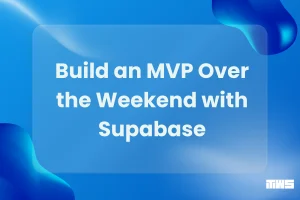The Software Industry in 2025: Bigger ≠ Better
In 2025, digital product development has never been more vital — or more fragile. According to Gartner, 75% of enterprise software projects fail to meet their time or budget goals. McKinsey reports that 45% of decision-makers are actively seeking to replace or downscale their current IT vendors (McKinsey Technology Trends Outlook 2025). The culprit? Slow, bureaucratic, and rigid service models that prioritize internal processes over client outcomes.
According to a 2025 Deloitte report on IT sourcing, 6 out of 10 organizations regret long-term contracts with large vendors, citing lack of flexibility and low innovation output (Deloitte 2025 Global Outsourcing Survey). For example, a mid-sized European fintech company shared that it took over 4 months to implement a simple feature due to internal alignment chains across departments of their vendor. By the time the feature was released, the business need had already shifted.
Meanwhile, lean, software tech partners are thriving. The growing demand for speed, adaptability, and product ownership has shifted the market’s center of gravity toward smaller, expert teams that move fast and deliver outcomes—not just documentation. Companies are increasingly opting for tech collaborators that act as an extension of their own teams, rather than rigid outsourcing executors.
The Hidden Cost of Working with Big IT Vendors
Large-scale vendors promise stability, scalability, and resources. In reality, they often deliver bloated workflows, unclear accountability, and multiple layers of decision-making.
- Time-to-Start: Enterprise-level onboarding can take 3–8 weeks due to internal procurement, NDAs, and managerial approvals.
- Delivery Delays: 30% of IT leads surveyed by Deloitte cite repeated deadline slips as the main risk of large vendor contracts.
- Misalignment: Layers of managers dilute product vision and slow response to real-time feedback.
- Resource Drain: Projects with large vendors often involve 20–40% of time spent on reporting and compliance alone.
One CTO of a U.S. healthtech startup shared anonymously via HBR’s 2024 vendor study:
“We spent more time managing the vendor than developing the product. They were efficient at covering themselves—not delivering value.”
Many clients report the same story: “We were drowning in meetings, documents, and change requests — with no shippable product in sight.”
Flexible by Design: Why Modern Software Partners Outperform Legacy Vendors
Modern software partners represent a new generation of development companies: focused, fast, and outcome-driven.
Unlike enterprise vendors bound by rigid structures, these partners operate with lean decision-making and full accountability. They integrate directly into your workflow, reduce friction, and deliver meaningful results in short cycles. What sets them apart isn’t brand size or volume — it’s engagement and agility. Instead of formal SLAs and cascading tasks, they take responsibility for product growth, adapt to the business, and focus on what really delivers results.
Unlike enterprise vendors bound by rigid structures, flexible tech partners operate with lean decision-making and full accountability. They integrate directly into your workflow, reduce friction, and deliver meaningful results in short cycles. What sets them apart isn’t size—it’s mindset. Instead of tracking hours and pushing scope, they take ownership of goals, adapt to evolving priorities, and focus on what actually drives product growth.
Unlike large vendors bound by internal structures, software tech partners operate with minimal hierarchy, giving them the ability to react faster, experiment more freely, and prioritize outcomes over process. They integrate directly with your team, reduce time spent on handovers, and deliver functionality in weekly sprints instead of quarterly reports. Their strength lies not in scale, but in proximity to the product and real business goals—allowing for continuous iteration, better alignment, and significantly faster time to value. These aren’t freelancers or outsourcing agencies. They’re lean product teams that work side-by-side with clients, deeply embedded into the product lifecycle.
Key traits of software tech partners:
- Direct access to leads and engineers — no PMO bureaucracy
- High adaptability to product and business changes in real time
- Shared ownership of results, not just fixed-scope delivery
- Low overhead, high engagement — fewer blockers, faster outcomes
- Lean team structure with flexible staffing and decision velocity
A 2025 report by BCG shows that software tech partners outperform traditional vendors by 30–45% in feature velocity and by 20% in stakeholder satisfaction.
They don’t disappear behind PM layers. Instead, they challenge assumptions, iterate fast, and align with business goals—often outperforming bigger players even on complex, regulated domains like fintech and healthtech.
Big Vendors vs Software Tech Partners: A Side-by-Side Comparison
| Criteria | Big IT Vendor | Software Tech Partner |
|---|---|---|
| Time to start | 3–8 weeks | 3–5 days |
| Decision-making layers | 3–5 management levels | Direct line to team leads |
| Delivery velocity | SLA-based, waterfall-ish | Outcome-focused, iterative |
| Product involvement | Superficial, spec-based | Deep, goal-driven |
| Flexibility | Low | Very high |
| Communication style | Email chains, status meetings | Slack, live calls, shared boards |
| Innovation support | Rigid, roadmap-locked | High, roadmap-aware |
| Risk handling | Contractual, reactive | Proactive, sprint-based |
Real Outcomes: How Companies Win with Lean Partners
Switching to a software tech partner isn’t just about “faster delivery.” It’s about business transformation.
Take Kizen, a U.S.-based platform for organizational enablement. After switching to Team Work Spirit:
- Customer satisfaction increased by 10–30%
- Operational performance improved by 30–50%
- Financial performance grew by 20–30%
What changed? A team that worked as an extension of the product org, iterating weekly, delivering measurable results, and adapting to strategy shifts in real time.
“We used to lose weeks on alignment and rework. Now we gain weeks on delivery and insight.” — Kizen Product Lead
How to Switch: From Legacy Vendor to a Real Tech Partner
Transitioning from a large vendor doesn’t mean burning bridges. It means redefining what you expect from a tech partner:
- Start small: pilot a feature or module.
- Test integration: check how the agile team meshes with yours.
- Evaluate outcomes: not time spent, but value delivered.
- Scale responsibly: expand once you see alignment and velocity.
Team Work Spirit offers structured onboarding, collaborative roadmapping, and flexible engagement models—all tailored to reduce transition risk.
Conclusion: It’s Time to Rethink Your Software Partner
In a market where agility wins and speed drives outcomes, the era of one-size-fits-all IT vendors is ending. If your current partner slows down your product, it might not be a partnership—it’s a liability.
Software tech partners like Team Work Spirit bring not just code, but clarity, ownership, and adaptability. We don’t just deliver software. We help scale products that matter.
Looking for a partner who actually moves as fast as your product needs? Let’s talk



